

In the Public Interest has made exciting progress over the past few years. Our team has worked incredibly hard, so I’d like to take a step back and share what we’ve been up to.
Even I was surprised by how much we’ve accomplished. We get calls every week from organizations around the country asking for campaign help; from state and local policymakers looking for model bills or support on legislative proposals; and from journalists needing background or quotes. Just recently, a Barcelona TV station interviewed me about private prisons in the U.S. (There are zero in Spain!)
When we added it up, we found that we’ve directly helped state and local organizations in 32 states, and our research and commentary have been cited in over 150 publications, including the New York Times and Wall Street Journal, and local papers across the country like the Cleveland Plain Dealer and Bakersfield Californian.
» Read more about: Public Interest Advocates Tally Up 2015 Victories »


Chicago just took a huge step towards closing the door on irresponsible sales of public assets and reckless outsourcing of public services. Last week, the city council passed an ordinance that mandates real public review of large privatization deals and increases transparency and contractor accountability.
The Privatization Transparency, Accountability and Performance Ordinance (PTAPO) is a significant move by Chicago’s leaders to ensure meaningful accountability to the city’s taxpayers and working families.
Unfortunately for Chicagoans, the rules weren’t in place a decade ago, when then-Mayor Richard M. Daley leased the Chicago Skyway toll bridge to an Australian-Spanish private consortium for 99 years. The bridge has since become one of the most expensive toll-per-mile roadways in the U.S.
But Daley’s lease of the city’s parking meters to Wall Street in 2008 is the ultimate example of privatization gone wrong. Chicago sold the meters to Morgan Stanley at least $1 billion under their value,
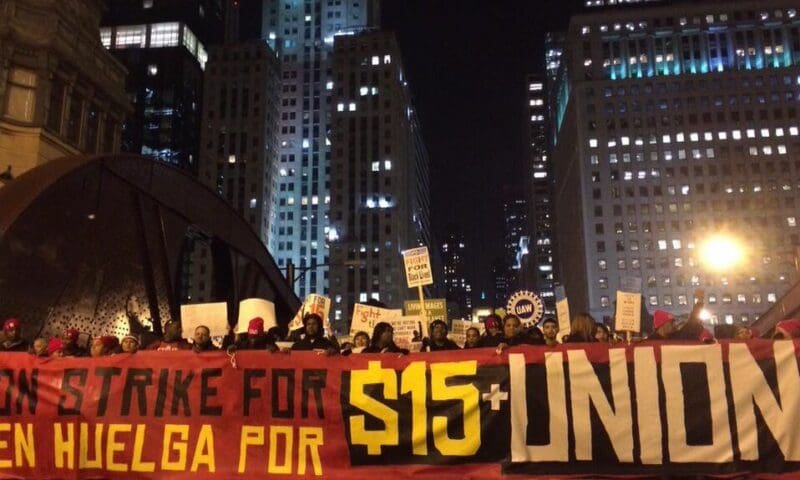

Last night’s Republican debate got underway following a day of national demonstrations in favor of raising the American minimum wage to $15 an hour — a day of protest accompanied by nothing-to-lose strikes by fast-food workers. The debate began with a question about raising the minimum wage. The first candidate to speak said America’s wages were, in fact, “too high” and that the current federal minim wage of $7.25 has to stay where it is.
The second presidential hopeful argued that the reason there are high unemployment rates among young African Americans is “because of those high wages.” The next candidate followed by calling the minimum wage “a disaster” for the 20th century and predicted catastrophe for the 21st should the day come when higher wages “make people more expensive than a machine.”
For a moment it looked as though the debate would become a contest to see which candidates would lower the minimum wage the most.
» Read more about: Not Debatable: Minimum Wage Movement Gains Ground »


High rent and low wages are squeezing poor and low-income families across California, including those living in its capital. But the Sacramento City Council’s actions on both economic issues are weak, some progressive critics say.
“The city caters to the continued gentrification of downtown,” Bob Erlenbusch, executive director of the Sacramento Regional Coalition to End Homelessness, said in an email to Capital & Main. “That is underpinned by market-rate housing surrounding the new arena.”
The vast majority of Sacramento’s low-income residents live outside the revitalized central city.
In 2014 the Sacramento City Council threw its political weight (without a public referendum) behind Golden 1 Center, the new $507 million downtown arena that is the future home of the Sacramento Kings basketball team. This September the council approved a plan for the city to issue $272.9 million in bonds,
» Read more about: Housing and Wages: The Sacramento City Council's Weak Half-Measures »


Truth might be seen as the third installment of an informal Robert Redford trilogy of films grappling with American electoral politics and its stormy romance with the news media. This triptych began with 1972’s The Candidate, a satire about a telegenic senatorial contender who manipulates his image to win an election. Then came the 1976 historical drama, All the President’s Men, which solemnly celebrated the Fourth Estate in its early efforts to gather news about the Watergate break-in. Truth represents the melancholy trail’s end of this journey, when money and product-branding have trumped principles in both governance and journalism. It’s based on former 60 Minutes II producer Mary Mapes’ memoir that told how she and CBS news icon Dan Rather lost their jobs over a poorly sourced segment about George W. Bush’s alleged attempt to dodge military service in Vietnam through the Texas Air National Guard.
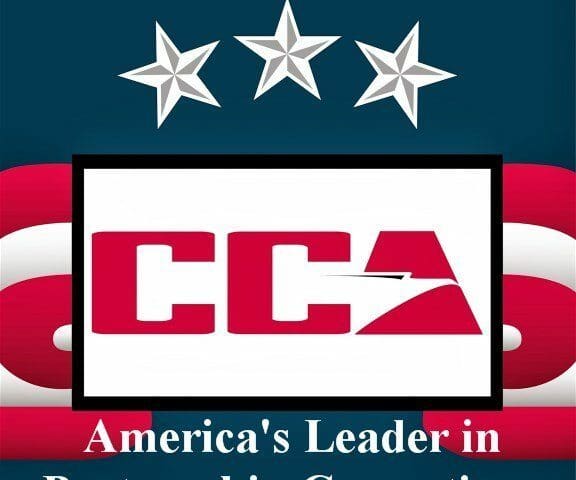

Like many states in the “tough on crime” era, Minnesota is struggling to reduce overcrowding in its prisons and jails. For now, the state’s government is paying counties to house over 500 incarcerated people that its prisons can’t hold. Corrections Corporation of America (CCA), the notorious private prison operator, says they have a long-term solution for Minnesota.
But Minnesotans, backed by the criminal justice reform movement sweeping the country, are responding with “No thanks!”
CCA wants to reopen the shuttered Prairie Correctional Facility in Appleton, MN, and lease space to the state. They deny they’re lobbying in Minnesota, but a politically connected lobbying firm, Goff Public Affairs, is pushing state officials to reopen the prison. That would be a costly mistake for both moral and economic reasons.
The company has a long rap sheet of cutting corners for the sake of profit,


You wouldn’t hand your laptop to a hacker, right? Well, the Senate could make a move just as foolish. They’ll soon vote on nominations to the U.S. Postal Service (USPS) Board of Governors and the nominees include a longtime advocate for postal service privatization and a lobbyist for the payday lending industry.
The Internet has changed how most of us communicate, but mail remains a central part of our communications infrastructure. A public postal service supports democracy and commerce by providing affordable mail service to everyone, rich or poor, in all areas of the country. It also nurtures marginalized communities by providing access to good jobs and career advancement.
Despite being under attack, including by the absurd requirement to “pre-fund” the next 75 years of its retiree health benefits in a 10-year span—a demand not made of any other federal agency or any well-run private company—the USPS has remained a vibrant public service.
» Read more about: Payday Loan Lobbyist Nominated to Postal Board »


Wisconsin Governor Scott Walker may have dropped out of the presidential race, but his influence is still haunting public workers, as evidenced by a bill that now sits on the desk of California Governor Jerry Brown. That legislation, SB 331 or the Civic Reporting Openness in Negotiations Efficiency Act (CRONEY), is the latest flashpoint in an ongoing war that Walker helped trigger when he moved to roll back the rights of public employee unions in early 2011.
While Walker was met with a huge backlash that drew protesters from across the country, in Orange County, local officials saw a green light to advance their own agenda against organized labor. Just a week after Walker signed Act 10, eviscerating collective bargaining rights for government workers in Wisconsin, the city of Costa Mesa issued layoff notices to nearly half its employees, paving the way for the outsourcing of hundreds of union jobs.
» Read more about: The Ghost of Scott Walker Visits Jerry Brown »


If there were still any doubt about Eli Broad’s desire to gut traditional public education, it has been erased by his much-discussed “Great Public Schools Now” initiative, a draft of which LA Times reporter Howard Blume obtained last month.
Broad’s 44-page proposal outlines plans to replace half of LAUSD’s existing public schools with charter schools. “Such an effort will gather resources, help high-quality charters access facilities, develop a reliable pipeline of leadership and teaching talent, and replicate their success,” states the document. “If executed with fidelity, this plan will ensure that no Los Angeles student remains trapped in a low-performing school.”
According to the proposal, Broad wants to create 260 new “high-quality charter schools, generate 130,000 high-quality charter seats and reach 50 percent charter market share.”
(Actually, LAUSD has 151,000 kids in charters now: 281,000 out of 633,000 LAUSD students is 43 percent. This isn’t the only imprecision in the proposal.)
The estimated cost of this LAUSD transformation would be nearly half-a-billion dollars.
» Read more about: Eli Broad and the End of Public Education as We Know It »


“How do you spell your name?” asked the beltway woman staring at her laptop in the lobby of a lavish Southern California resort. Was she Googling me? I tried not to panic. Instead, playing up the jetlag, I quipped that I really did know my name by heart and gave her one of my business cards that said I was a consultant. Then I realized she was typing my name to put on my badge. Casually she handed me my lanyard, schedule and swag bag.
I was in!
Why are reporters barred from attending the Community Financial Services Association of America (CFSA) annual conference? Why all the secrecy? The organization says full disclosure and transparency are part of their best practices – but no media or streaming are allowed at its annual shindig. This is a $46 billion dollar industry based on subprime (they now call it nonprime) customers —
» Read more about: Payday Lenders: 'We're Not Bottom Feeders!' »


It was 2008 and presidential hopeful Barack Obama was inspiring millions of people with his promise to disrupt politics as usual – and a new startup called Airbnb was turning that enthusiasm for change into millions of dollars. Denver, the site of that year’s Democratic National Convention, was expecting 80,000 people to come watch the senator from Illinois accept his party’s nomination. The city had space for less than half.
“Obama supporters can host other Obama supporters,” is what CEO Brian Chesky recalls thinking to himself. In a profile of the company, the Huffington Post notes how that idea was turned into cash. “Airbnb, which lets users rent out part or all of their homes, blasted bloggers in Denver with company information.” It “sold ‘Obama O’s’ cereal around town,” garnering news coverage as “an innovative solution to the city’s lodging crisis.”
Founded in 2007, Airbnb is today valued at more than $25 billion and the for-profit sharing economy it helped usher in is no longer so new.
» Read more about: The Sharing Economy's Liberal Lobbyists »
I hope the oil lobbyists in Sacramento broke out some high-priced Champagne this weekend. They deserve it. They just scuttled the biggest and most likely-to-succeed effort in the history of California to save the planet.
Oil industry ad decrying what it called the “California Gas Restriction Act of 2015”
Senate Bills 350 and 32 had already passed in the upper house. As my Capital & Main colleague Bill Raden summarized, SB 32, authored by state Senator Fran Pavley (D-Agoura Hills), would “extend the greenhouse gas (GHG) emission reductions” achieved a few years back through Assembly Bill 32. Senate bill 350, introduced by Senate president Pro tempore Kevin de León (D-Los Angeles) – named after the threshold of carbon particles per million that our planetary life cannot surpass – aimed to set standards for California that would “double the energy efficiency of its older buildings,
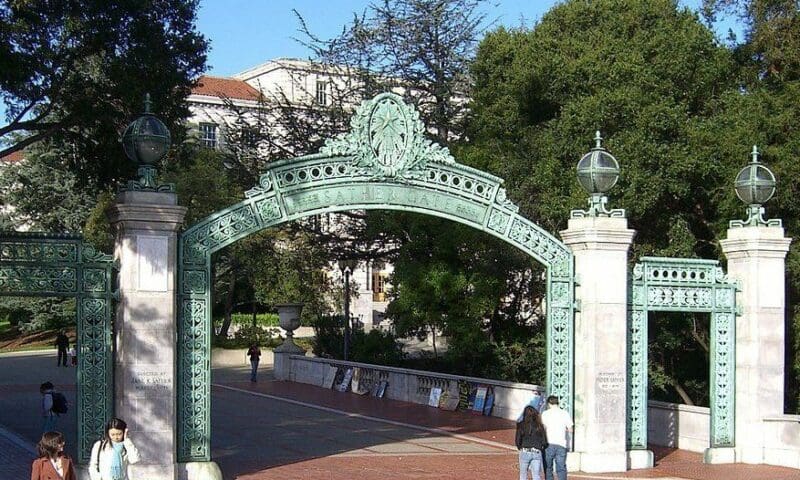

When California Governor Pat Brown helped create the modern University of California system in the early 1960s, he envisioned many things: a world-class structure of higher education, universal access to students from every background, a gateway to middle-class careers, cutting-edge research centers. All of that has come to pass, making UC an enduring part of Brown’s legacy.
One thing Brown did not foresee, however, was UC becoming embroiled in an emblematic fight over economic inequality, with critics charging that one of the nation’s most prestigious public institutions is perpetuating poverty.
The controversy over UC’s use of thousands of contract workers who earn low wages with few, if any, benefits has taken center stage in Sacramento, where legislation that would end such practices cleared the Legislature last week. The fate of Senate Bill 376, sponsored by state Senator Ricardo Lara (D-Bell Gardens), now rests with Pat Brown’s son,
» Read more about: Jerry Brown’s University of California Perma-Temp Problem »


State lawmakers returned from the Labor Day weekend to face a potential Greek tragedy as the current legislative session enters its final days. Taking center stage is a contentious battle pitting the oil industry, the California Chamber of Commerce and a group of business-friendly Democrats against two history-making global warming measures.
Senate Bill 32, authored by Senator Fran Pavley (D-Agoura Hills), seeks to extend the greenhouse gas (GHG) emission reductions already achieved by Assembly Bill 32, a bill Pavley helped write as an assemblymember, and which became the state’s highly effective 2006 carbon cap-and-trade law.
Senate Bill 350 is the attempt by Senate President Pro Tem Kevin de León (D-Los Angeles) to spell out the “Golden State Standards 50-50-50” that Governor Jerry Brown unveiled in January’s State of the State address. It would require California to double the energy efficiency of its older buildings,
» Read more about: Sacramento Battle Over Historic Climate Change Bills »
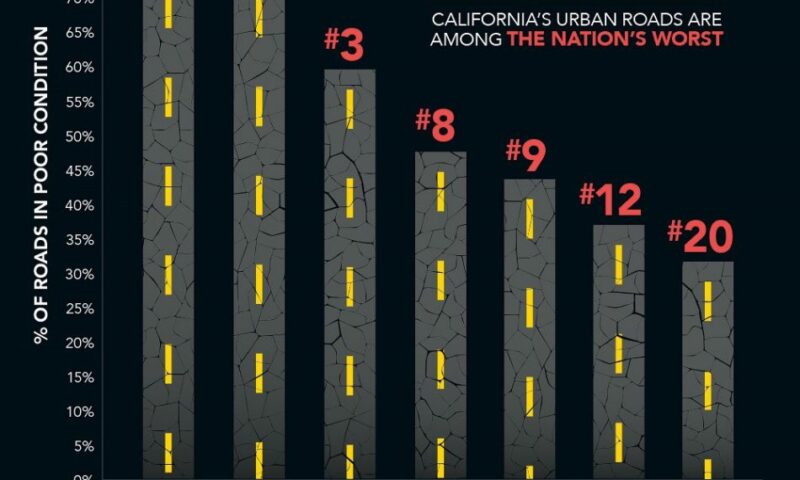

Lucy Dunn has a message for Republican lawmakers: Approve new revenue now to fix California’s decaying highway and bridge system or face severe economic consequences that will be felt throughout the state for decades.
Dunn is no big-spending liberal and you won’t find a Proud to Be Union bumper sticker on her car. In fact, she’s president of the influential Orange County Business Council and a card-carrying Republican. But to Dunn, funding long-neglected transportation maintenance and repairs is an existential issue for California’s business community.
“If you can’t move people and goods on safe roads and bridges, you cannot do business in the state,” Dunn tells Capital & Main.
California ranks 45th among the 50 states for overall highway performance.
This fundamental lesson was brought to urgent life in July, when a bridge collapsed along Interstate 10 during heavy rains,
» Read more about: Can a Business-Labor Alliance Save California’s Infrastructure? »
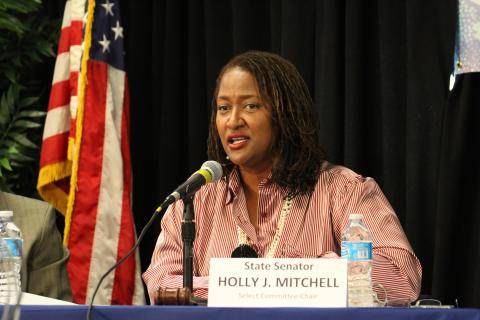

According to a Sacramento Bee story published today, California State Senator Holly Mitchell (D-Los Angeles) has dropped her campaign to pass Senate Bill 23, which would have repealed the Maximum Family Grant rule, a 20-year-old law that blocked state welfare services for children born to mothers who receive welfare. The Bee’s Capitol Alert story reported,
Mitchell’s bill is currently awaiting a vote on the Assembly floor, and she said she would instead push to get the policy into next year’s budget.
“How would we pay for it?” Mitchell said. “Because of the huge price tag, I’m going to continue working with the administration during the interim.”
Writing in Capital & Main, Judith Lewis Mernit recently described the Maximum Family Grant rule as “a relic of a 1990s-era conservative belief that women were deliberately having more babies just to rake in more benefits,
» Read more about: Holly Mitchell Drops Bid to Restore Child Welfare Cuts »


Last week, in a powerful affirmation of the common good, commissioners in Tennessee’s Johnson County unanimously opposed the privatization of the state prison within their county’s limits. A response to fears that the state government could soon outsource management of the Northeast State Correctional Complex, the resolution reads like a checklist of what democracy and public control can provide a community.
The “no” vote was prompted by the state government’s recent exploration of outsourcing the management of state properties, including prisons, hospitals, parks and even the University of Tennessee. State officials have also been trying to manage a shortage of prison officers after introducing a controversial overtime policy statewide to cut costs.
But the Johnson County commissioners recognize that outsourcing isn’t the answer: “Any type of privatization would be detrimental to our county, citizens and staff of Northeast Correctional Complex.” They also honored public service by dedicating a day each year in recognition of the prison’s current staff.
» Read more about: Counties Say No to Privatizing Their Prisons »
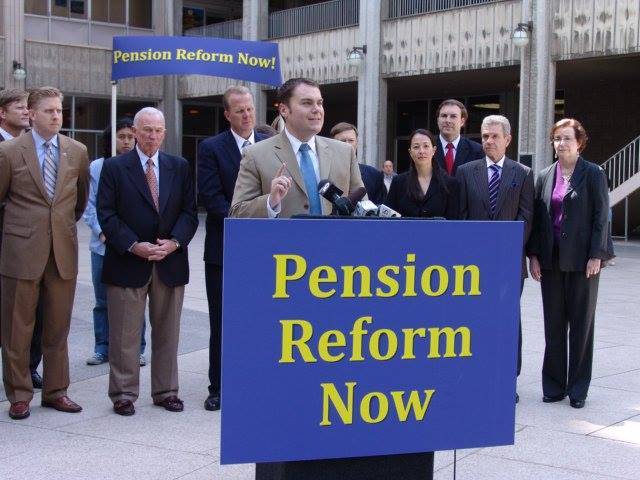
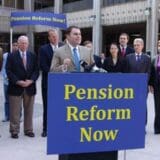
Backers of a proposed statewide ballot measure that would radically change the way wages and pensions of California’s government employees are formulated have begun an email campaign seeking pledges of support for the measure – as well as volunteers to circulate signature petitions when they become available in a few weeks.
The pension activists have 180 days from August 11, the date Attorney General Kamala D. Harris assigned a full title and ballot summary to the measure, in order to qualify it for the November, 2016 election.
Such email campaigns can help an initiative qualify for the state ballot if coupled with other efforts, Mike Madrid of Grassroots Lab, a Sacramento-based public affairs group, told Capital & Main by phone. “But if it is the only thing you are doing the chances for success are slim.”
In ballot-box politics, the bottom line is money.
» Read more about: Leaders of Pension-Cutting Ballot Proposal Look for Supporters Online »


As public officials across the country continue to manage shrinking budgets, experiments for funding public services are emerging. One new idea, the Social Impact Bond, has been advertised as a “win-win” for private investors and the public, but the reality is beginning to look a little different.
The results are in from the first SIB tried in the U.S. and it failed to meet its goals. The SIB was aimed at reducing the rate by which adolescents housed on Rikers Island returned to jail, with a goal of at least an 8.5 percent drop. Therapy was provided to inmates, but recidivism wasn’t significantly reduced.
SIBs are complex arrangements—private investors lend funding for a program and the government repays them only if certain goals are met. For the Rikers SIB, New York City was lent millions by Goldman Sachs, backed by Bloomberg Philanthropies.
Proponents of SIBs claim that,
» Read more about: Wrong Island: Why Are Privatizers Applauding Failed Prison Experiment? »


When the U.S. Census Bureau released figures identifying California as having the highest poverty rate in the nation, the news would not have shocked the 4.8 million low-wage earners at the bottom of California’s income divide. For those single workers and families that subsist paycheck to paycheck, and too often make up the difference by maxing out credit cards or taking out predatory short-term loans, life’s a precarious balancing act even when things go well.
But when unforeseen calamities strike, such as serious health emergencies or the loss of a job, hard-pressed households are left without a safety net. Unable to keep up payments, loans fall into default and too often result in crippling court-ordered garnishments that claim up to a quarter of earnings.
SB 501 quickly ran afoul of the powerful California Bankers Association and debt-buyer lobbyists.
“We see increasing numbers of these families in our legal aid services throughout the state,” the Western Center on Law and Poverty’s Jessica Bartholow told Capital &
» Read more about: Garnishing California's Future: New Bill Seeks to Curb Wage Seizures »